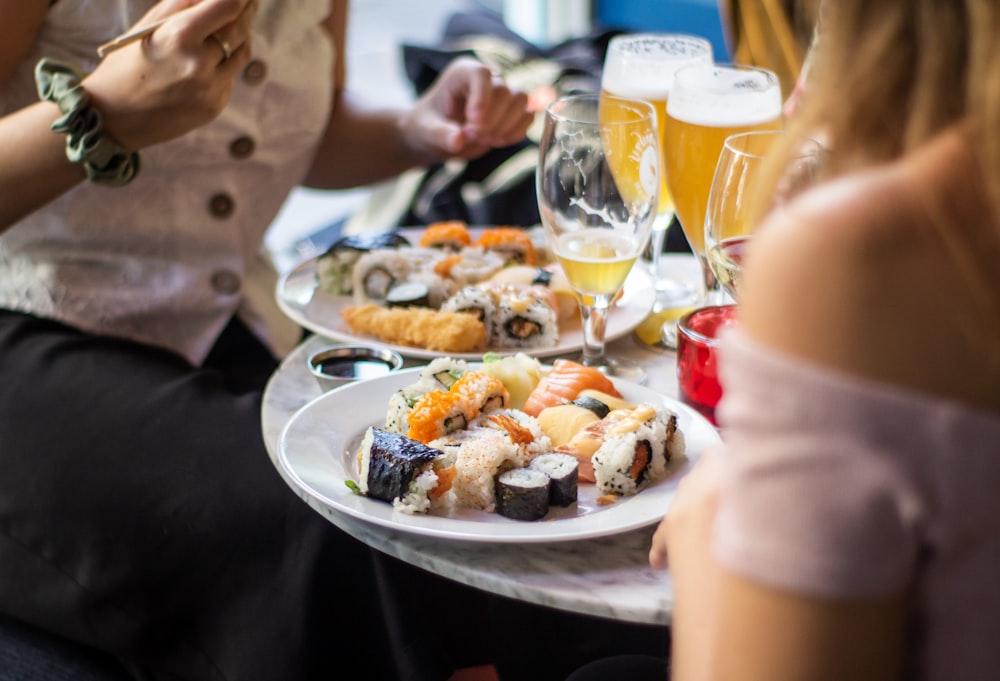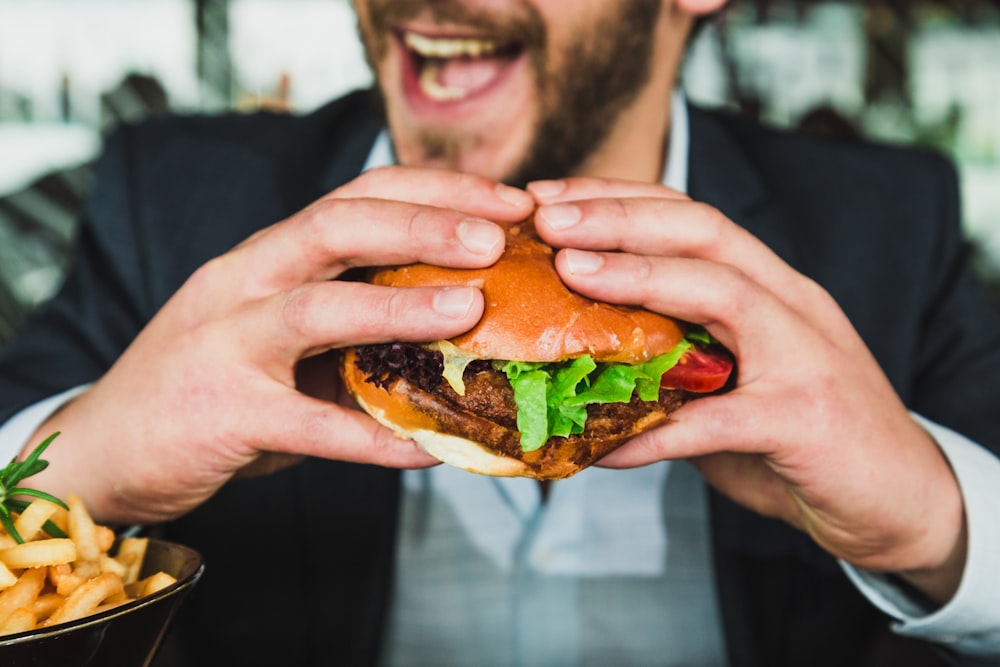
Eating intuitively is a term that's been thrown around for years, but what does it really mean? Intuitive eating is about following your natural hunger cues and listening to your body when deciding when to eat. It's not about dieting or counting calories, but rather learning how much food you need in order to feel satisfied without overeating. Learn more by reading the rest of this blog post!
What is intuitive eating?
Intuitive Eating is a revolutionary new way to feed your body and mind. It was created by two dietitians, Evelyn Tribole and Elyse Resch, in 1995, who found that the traditional Western diet isn't always enough for everyone's needs - especially those looking or maintaining their weight loss goals.
It integrates instinctive feelings with rational thought while also being mindful about what you're putting into yourself. Hence, as longs as possible, avoid deprivation-style tactics like binging on junk foods when stressed out or if feeling lonely due to lack of social media distractions, among other things, which can lead us down unhealthy paths without even realizing until it's too late!
Why it's important to eat intuitively?
Why it's important to eat intuitively or to be mindful about what you eat?
As well as avoiding deprivation-style dieting, mindful eating also helps satiate your hunger faster and avoid unnecessary snacking, which can lead to feeling uncomfortably bloated whenever it's time to digest food. For example, if you're someone who has a little snack every now and then out of boredom or because you feel like it - try not to do this often. By keeping track of how much food you've had throughout the day without having too many snacks in between, it'll help keep your stomach from getting bloated. If this is already an issue for you, try cutting down on the amounts of processed foods you eat because these tend to be the worst culprits when it comes to digestion issues.
Eating intuitively and exercising.
Exercise is also a key factor when it comes to your digestive system. If you don't have a regular exercise routine, this can be problematic because digestion becomes stagnant. We tend not to drink enough water as well, which causes our bodies to harden and become constipated from time to time. Exercise helps keep the body flexible and hydrated so that proper amounts of nutrients can be digested into energy levels whenever they're needed – whether it's during a workout or somewhere throughout your day – having a healthy balance is the best way to go about things.
If you're active, your digestive system tends to have a much easier time. You feel lighter and experience fewer stomach pains or cramps that tend to go along with being constipated, bloating throughout the day, etc. It's definitely something to keep in mind when deciding if exercise is important for you.
In terms of both emotional and mental health, movement is incredibly important if you feel like:
• Your energy levels are at an all-time low.
• You're feeling sluggish and completely unmotivated to do much of anything; or that you're dragging yourself through the motions with little passion or enthusiasm.
• If you've been feeling moody, anxious, or simply not like yourself for a prolonged period of time.
• You lack confidence and/or self-esteem, and it's adversely affecting your quality of life. It will help to give you back the power you're longing for – and has done so for countless individuals before you – by helping to boost your energy levels and increase motivation and performance both in and out of the gym.
How to get started with intuitive eating?
In a nutshell, intuitive eating is about learning to listen to your body's hunger and fullness cues in order for you to eat based on what it actually needs and when it actually needs it.
The first step towards intuitive eating is to recognize that food isn't the enemy and neither are diets. Diets mean restriction, which means eventually breaking down and bingeing. Food can be enjoyed at any time of day while still losing weight if the right choices are made.
You'll do best by starting with very modest goals such as trying not to add any additional 'bad' foods into your diet while increasing your intake of good foods such as vegetables, egg whites, lean meats, etc.… Simply focus on clean, whole foods at every meal.
10 Principles of Intuitive Eating
Here are ten principles of intuitive eating:
1. Reject the Diet Mentality
No good can come from thinking of food as good or bad or something to be earned or denied. There is no diet that will work for you in the long term, so it's time to stop looking around for one that does. The way to be healthy and happy is to stop obsessing about food and weight.
2. Challenge the Food Police in Your Head
Don't let negative thoughts about yourself sneak into your head (e.g., I'm lazy; I had a huge lunch; I deserve this). Recognize them as false messages meant to undermine your resolve and counter them with positive self-talk (e.g., I'm doing the best I can; we all make mistakes; I am enough just as I am).
4. Challenge Diet Rules and Dismantle the Food Myths You've internalized
Figure out what your rules and beliefs around eating are and write them down so you can tackle each one and clearly see why it no longer serves you. Once you identify that a rule isn't helping, come up with a positive alternative that's more on course with intuitive eating.
For example, if diet thinking has led to cutting certain foods out of your life, think about what you would need to add in to get the balance right again. Or consider how making an exception for holidays or celebrations can help reduce feelings of deprivation and bring more balance to your relationship with food over time.
5. Nourish Your Body With Mindful Hunger and Fullness
Time for a bit of experiment: next time you eat, slow down and pay close attention to how the food tastes, smells and feels in your mouth. Tune into thoughts such as I'm getting full or I still have room left over. Also, consider how satisfied you feel deep down—not just about what you're eating, but also whether there are any feelings of emptiness that may be driving you to eat outside of physical hunger. Begin to make notes about these experiences after meals so you can see patterns emerge (for example, maybe foods high in sugar help comfort emotions like boredom or loneliness). Once you've noticed these associations, ask yourself whether they're really worth it. Doing this will help you to begin tuning in to your own internal signals of hunger and satiety—and create a more fulfilling relationship with food as a result.
In other words, be present as you eat. More specifically, according to studies from Cornell University's Food and Brand Lab, tune in to at least three dimensions: what you see, smell, and taste; how full or satisfied the food makes you feel; and finally, why you want to eat this particular food (e.g., to satisfy a craving).
Experts call this style of eating intuitive eating. It focuses on being present during meals without any distractions such as TV shows or phones buzzing with work emails. In other words, you're eating for one.
6. Be at peace with food.
Resolve never again to fight with your body over what you eat; instead, listen to and trust your body's messages about eating and hunger.
We know—food is supposed to be a source of joy, but those super-rich desserts make us feel guilty, and those fried cheese curds are oh-so-delicious but do terrible things for our waistlines. And the list goes on. The key? Savour food without any distractions or judgments as you would an expensive meal at your favourite restaurant.
Essentially, quit worrying about what you eat so much and enjoy it instead. This doesn't mean it's time to go hog wild; remember point one above. Intuitive eating actually stems from mindful eating, which has become increasingly popular in recent years thanks in part to meditation practices that encourage nonjudgmental observation of thoughts and feelings rather than stress and worry. Without the constant worry of what you're eating, it's much easier to know when you're actually hungry or full in a way that can't be confused with emotional feelings.
The best part about the theory is how simple it really is: If you're truly hungry, eat until your stomach feels like "a small ball," (how intuitive!) rather than eating to the point where you feel sick. And when your body naturally decides it's had enough? Stop! Mindful eating also means tuning into your body instead of tuning out while binge-watching Netflix, which can make all the difference when trying to cut back on mindless snacking (hello again, fried cheese curds).
It may seem radical at first, but give it a try: For the next month, eat when you're hungry and stop when you're full — no matter how many burritos or french fries call your name — and we promise, you won't feel like such a glutton by the end.
7. Eat meals with people you enjoy.
Hanging out in the dining hall or at a restaurant by yourself will only compound feelings of loneliness and isolation, which is not exactly a recipe for weight loss. Plus, when you sit down to dinner with others every night, you'll have an opportunity to socialize while enjoying your food — bonus points if you have conversations that aren't about calories, carbs, or how much you ate last night.
8. Don't be too hard on yourself after binging episodes.
You've heard this one before: Eat what you want and then move on. However, that might be easier said than done; once the binge-eating cycle starts rolling downhill, it's difficult to stop it. But, try to avoid being too hard on yourself by remembering that this is something everyone goes through. Just pick up where you left off and start fresh tomorrow.
9. Be conscious of the foods you are putting in your body
This may seem like kind of a no-brainer, but it's definitely easier said than done. Plus, lots of us start second helpings, finish our kids' plates when they're not looking, or eat standing up; making sure that what we're eating will actually nourish us is one of the most challenging things about intuitive eating. Start paying attention to your body and notice how certain foods make you feel. For example, I used to eat out of boredom, and the way that affected me was: my legs would start to twitch and shake like crazy (I called it "happy feet"), and then I'd get a headache soon after. That gave me a clue as to what those things were doing inside of me, which made it easier for me to stop eating them.
10. Respect your hunger and honour your health with gentle nutrition
Most people have been taught from a young age to ignore their hunger signals because it's rude or inappropriate or undignified or something else horrible if they just take care of themselves by satisfying their needs. When we do this, our bodies become confused because we're not giving the feedback it needs. Here's a good example: we know that if we touch an open flame and get burned, we're going to go ahead and stop touching the open flame because it hurts. It does not make sense for us to keep our hand on the flame until our arms burn up as well, right? Then how come lots of people choose to ignore those hunger pains until they make themselves physically ill?
Well, you can't ignore your hunger anyway (sorry) because it'll turn into some other kind of pain like chronic headaches or stomachaches or something else that isn't very nice – and then you'll actually have to deal with ignoring that instead. Not fun, huh? You might think that no one will notice if you just eat a little bit less, but that's where you're wrong. Your body is excellent at keeping track of all the factors that affect it, which means you'll have to start being sneaky if you want to get away with eating less. Odds are you won't get very far before your body figures out what's going on and raises hell until you've gotten yourself some decent nutrition.
Tips for sticking to this new way of living
Intuitive eating isn't easy. It requires patience and practice. But the potential benefits of learning how to eat intuitively are well worth it: you'll learn to tune into your body so you can be aware of what it needs instead of mindlessly reaching for food out of boredom, stress, habit, or other emotions. With a better understanding of hunger cues and willpower, management comes more significant control overweight fluctuations. And if you need help breaking old habits related to emotional eating, forming new ones that promote healthy behaviours may eventually become second nature to you.
By honouring hunger cues, knowing why you want to eat, and being mindful of what you put in your mouth—without judgment—you can form a healthier relationship with food. This isn't an easy task, which is partly why so many people struggle with diets that lack flexibility or are too complicated. But the upside of intuitive eating is far greater than any benefits from restrictive dieting.
Because intuitive eating emphasizes listening to internal cues of hunger and satiety instead of imposing rules around food choices or scheduled meal times, it's largely considered a non-diet approach to improving healthful habits. Still, if you have a history of disordered eating behaviours—such as bingeing on foods like those high in added sugar, consuming foods that are low in nutrients, or using extreme measures like fasting, diet pills, laxatives, and self-induced vomiting—it's best to talk with your doctor before making any changes.
The benefits of following an intuition-based diet plan
Following an intuition-based diet plan has several advantages:
- Possible weight loss
- Increased energy and vitality
- Better sleep patterns
- A decrease in PMS symptoms and relief from menopausal symptoms
- Decreased mood swings, anxiety, and depression
- Improved self-image and body acceptance
- More peaceful relationship with food
- Improved concentration and productivity
- More happiness and joy!
An intuitive eating food plan can be tailored to fit your lifestyle and preferences.
It's okay to have preferences, whatever they may be! It's also okay to make mistakes—in fact, it's a necessary part of the process. Allowing yourself to trust your body and your intuition is important when trying out a new eating style.
Intuitive eating applies to everything
Intuitive eating doesn't only apply to diet—it applies to everything. Intuition often guides us towards more positive, healthy behaviours in general. For example, if you have the intuition that exercising daily makes you feel better about yourself, then you can make it a priority to exercise frequently. Or, if you have the intuition that spending time reading a good book every day will boost your self-esteem, then you should prioritize taking some time out of each day for this activity. Intuition also helps us to avoid negative behaviours that we know deep down aren't good for us. If you've tried drinking alcohol before and made yourself sick, then intuitively you probably know that this isn't something you want to do again!
Intuitive eating is about being honest
It's important, to be honest with yourself when trying out new foods or diets—especially if they seem unhealthy or restrictive in any way. Being dishonest with food—and more importantly, being dishonest with your own body—can lead to extreme weight gain, nutrient deficiencies and other issues.
Intuitive eating is about being kind to yourself
It's not just about being honest, but intuitive eating is also about being kind. We've all been there—we're sitting in front of the television or computer with a huge plate of food in front of us. Although this might be for very practical reasons (e.g., leftovers, little time to prepare something else) it's also an easy way to stuff food into our mouths without really feeling it.
When you're eating mindfully, you're not just paying attention to the physical sensation of chewing and swallowing your food—you are also aware of what's going on emotionally. You are probably hungry or you might be craving a specific type of food. But when do these cravings become out of control? How can you tell when they are actually emotional needs rather than actual hunger? Think about how you feel when you eat that food in front of the television. What is it doing for your mood? Does that plate of pasta make things better or worse in the long run?
The good news with intuitive eating is that there is no right or wrong way to eat. All that matters is listening and responding to your body's hunger and fullness signals.
Intuitive eating can be part of your healthy lifestyle
Sensible dieting isn't about cutting unhealthy foods out of your life for good—it's more about gradually introducing healthier options into your diet while learning how to say no to the bad stuff.
This is a very positive way of looking at intuitive eating - you are not restricting any food groups but instead slowly adding in healthier options as time goes on!
Common misconceptions about intuitive eating and how they can affect your weight loss goals
The most common misconceptions about intuitive eating are listed below:
- You must be hungry every hour of the day or feeling deprived in order for this diet plan to work;
- It's not possible that someone could feel full on less than 300 calories per meal/day
- A person will gain weight if their plate is too big at mealtimes
- The key with these types of diets isn't exactly what you put on your fork but rather how much fat & protein one eats
- All foods can become normalized after long-term sustainable use1. The myth that you can't be overweight and eat intuitively
- The idea that eating intuitively ignores hunger cues
- You have to give up all your favourite foods when engaging in intuitive eating
- Intuitive eating is the same as being a "food addict."
- Intuitive eaters don't care about nutrition.
Intuitive eating is a lifelong skill.
Finally, intuitive eating is a lifelong skill. As with most things in life, the more you work at it, the better you'll become at understanding your internal cues of hunger and fullness—and practicing them with food choices.













